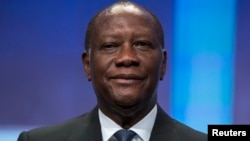ABIDJAN —
Ghana accused the Ivory Coast in July of sending hit squads earlier in the year to abduct and kill exiled supporters of ex-Ivorian President Laurent Gbagbo, according to a report by a U.N. experts panel.
The accusations risk further aggravating tensions between the two West African neighbors under strain since thousands of Ivorians fled across the border amid a 2011 civil war.
The conflict was sparked by Gbagbo's refusal to accept defeat to rival Alassane Ouattara in a presidential election in late 2010, and a number of Gbagbo's top military and government officials are among the refugees hosted by Ghana.
In a July 10 meeting with a U.N. Group of Experts - which monitors compliance with Liberia's sanctions regime - Ghanaian authorities said Ivory Coast had sent “agents intending to assassinate or kidnap militant pro-Gbagbo refugees”.
“The Ghanaian authorities claimed to have foiled at least two such missions in early 2013,” the experts wrote in a report to the U.N. Security Council, released on a U.N. website at the weekend.
The accusations could not be independently verified, the panel wrote. Ouattara's government denied the charges.
“Do you really think that we would have failed if we'd wanted to do this?” Ivorian government spokesman Bruno Kone said in Abidjan on Monday, noting that the U.N. panel had said it could not verify the information from the Ghanaian government.
Senior Ghanaian officials told Reuters they were unaware of the allegations about Ivory Coast.
Mercenaries bought off
Gbagbo is awaiting trial at the International Criminal Court for his alleged responsibility for crimes against humanity during the war in which around 3,000 people were killed.
Ouattara's government and U.N. investigators accuse Gbagbo allies now living in Ghana of continuing to orchestrate violence in Ivory Coast with a series of attacks from late last year.
They also say the Ghana-based exiles had hired Liberian mercenaries to carry out deadly raids on villages in Ivory Coast's cocoa-rich western borderlands.
The U.N. report said an intelligence arm of the Ivorian Interior Ministry had countered this by paying off Liberian mercenary leaders, beginning in May, to gather information and stop the cross-border attacks,
Ivorian officials used a former official with Liberia's National Security Agency as an intermediary and did not notify Liberia's government of the payments to mercenaries including Isaac “Bob Marley” Chegbo and Augustine “Bush Dog” Vleyee.
Ivorian government spokesman Kone said no such payments had been made “officially at our level”.
The U.N. panel said it did not consider the payments, which ranged from $2,000 to $8,000, a sustainable method for ensuring security along the Ivory Coast's border with Liberia.
The accusations risk further aggravating tensions between the two West African neighbors under strain since thousands of Ivorians fled across the border amid a 2011 civil war.
The conflict was sparked by Gbagbo's refusal to accept defeat to rival Alassane Ouattara in a presidential election in late 2010, and a number of Gbagbo's top military and government officials are among the refugees hosted by Ghana.
In a July 10 meeting with a U.N. Group of Experts - which monitors compliance with Liberia's sanctions regime - Ghanaian authorities said Ivory Coast had sent “agents intending to assassinate or kidnap militant pro-Gbagbo refugees”.
“The Ghanaian authorities claimed to have foiled at least two such missions in early 2013,” the experts wrote in a report to the U.N. Security Council, released on a U.N. website at the weekend.
The accusations could not be independently verified, the panel wrote. Ouattara's government denied the charges.
“Do you really think that we would have failed if we'd wanted to do this?” Ivorian government spokesman Bruno Kone said in Abidjan on Monday, noting that the U.N. panel had said it could not verify the information from the Ghanaian government.
Senior Ghanaian officials told Reuters they were unaware of the allegations about Ivory Coast.
Mercenaries bought off
Gbagbo is awaiting trial at the International Criminal Court for his alleged responsibility for crimes against humanity during the war in which around 3,000 people were killed.
Ouattara's government and U.N. investigators accuse Gbagbo allies now living in Ghana of continuing to orchestrate violence in Ivory Coast with a series of attacks from late last year.
They also say the Ghana-based exiles had hired Liberian mercenaries to carry out deadly raids on villages in Ivory Coast's cocoa-rich western borderlands.
The U.N. report said an intelligence arm of the Ivorian Interior Ministry had countered this by paying off Liberian mercenary leaders, beginning in May, to gather information and stop the cross-border attacks,
Ivorian officials used a former official with Liberia's National Security Agency as an intermediary and did not notify Liberia's government of the payments to mercenaries including Isaac “Bob Marley” Chegbo and Augustine “Bush Dog” Vleyee.
Ivorian government spokesman Kone said no such payments had been made “officially at our level”.
The U.N. panel said it did not consider the payments, which ranged from $2,000 to $8,000, a sustainable method for ensuring security along the Ivory Coast's border with Liberia.





